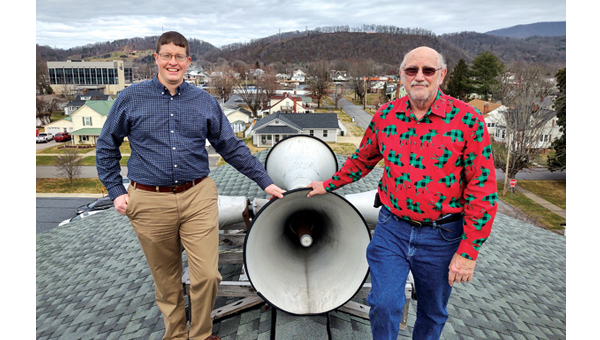Thank you to the ‘keepers of the chimes’
Published 4:08 pm Wednesday, December 23, 2020
|
Getting your Trinity Audio player ready...
|
Dong dong…ding dong.
The joyful ringing of church bells greet those who live and work in the downtown Elizabethton community every weekday morning and again when they sit down to dinner in the evening. The chimes also play at 12 noon.
Since ancient times, bells have been a spiritually and historically important part of religion and society the world over. The first bells date to the 11th Century BC and the Chinese large barrel brass bells with ornate designs.
Of course, there are still people and churches who ring bells the old-fashioned way – with ropes.
In the digital age we live in, you might think this old musical art form would be fading like a lonely chime in the night. But not so, it still has meaning.
At First United Methodist Church in Elizabethton, the chimes that play three times daily are automated and the sound is amplified through bull horns mounted on the church roof – facing east, west, north and south.
Hundreds of songs have been programmed into the automated system which can be set to play at any time. At First United Methodist Church, the keeper of the chimes are Wesley Bradley and Robert Carroll.
Bradley, who has been at the chore for 20 years, was recently joined by Carroll, who oversees a new sound system. Bradley is a third-generation member of First United Methodist and is proud to be a keeper of the chimes. It’s never been a chore he took lightly. In fact, it has been a ministry.
The first system was put in place more than 30 years ago by Jim Sharp, an electrical engineer. “It was a system that used floppy discs, and each season, the disc with a new set of music had to be changed. He trained me on the system. Sadly, it lasted longer than Jim did,” Bradley said.
Ron Laws then took it on himself to upgrade the floppy disc system to a digital system. The music is sounded out to the community through the same four bull horn speakers that Sharp installed.
Bradley explained that the digital music system has a central cabinet about the size of a stereo outside the pastor’s office. “It has a light bulb on the exterior of the cabinet that lights up to let us know if the power has gone off and to alert if something is wrong with the system,” said Bradley.
He explained that the digital system is much more manageable than the floppy-disc system, and is much cheaper than if real bells were used. “The sound simulates the toning of real bells, after which two hymns are played – usually with a seasonal theme. Naturally, we are playing Christmas music now. Many think the soft ringing of old bells is real, but what they are really hearing is a computer. It has no moving parts, but the exact same tone of real bells. It is much like listening to a taped sermon,” Bradley said.
He said the music usually lasted about two minutes, and can be heard in the downtown section, reaching all the way to Watauga River, north of town, to the top of Lynn Mountain, to Paty Hill, and to T.A. Dugger Junior High School.
Sundays, the bells are chimed only at service time at 10 a.m. and at noon, when church is dismissed. On Saturdays, the 9 a.m. toning of the bells and music is omitted as not to wake those who sleep in on the weekend.
More recently, Bob Carroll has assisted Bradley in managing the system and is organizing a lot of the music playlist. Among the playlist are the more classic hymns such as Rock of Ages, How Great Thou Art, Amazing Grace, etc.
“The chimes have been a mission of our church for a long time. I continually have people who tell me how much the chimes mean to them. It’s a good testimony. We actually have had people attend the church because of the chimes,” Bradley shared.
In the beginning church bells were a way to arouse the rest of the wold that Sunday morning services were happening, or a wedding was occurring, or a funeral.
The computerized system does the same thing as real bells did in the beginning. They call us to worship, to praise, to stop and pray, and be thankful even in the darkest and saddest of times, such as the pandemic, which in recent months has changed the way we worship and do church.
There will always be a love for bells and there will always be someone to play them – even if it is a computer. To the keepers of the chimes, we say “thank you.’” It’s a gift to the community that we sometimes take for granted. It is the voice of the church.





